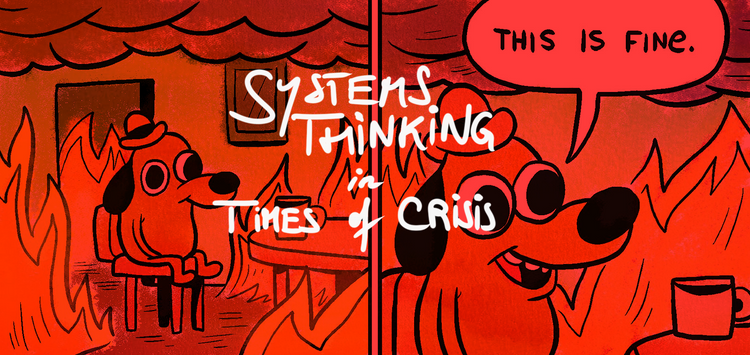The Stromberg Mindset: On Germany's Geopolitical Delusion
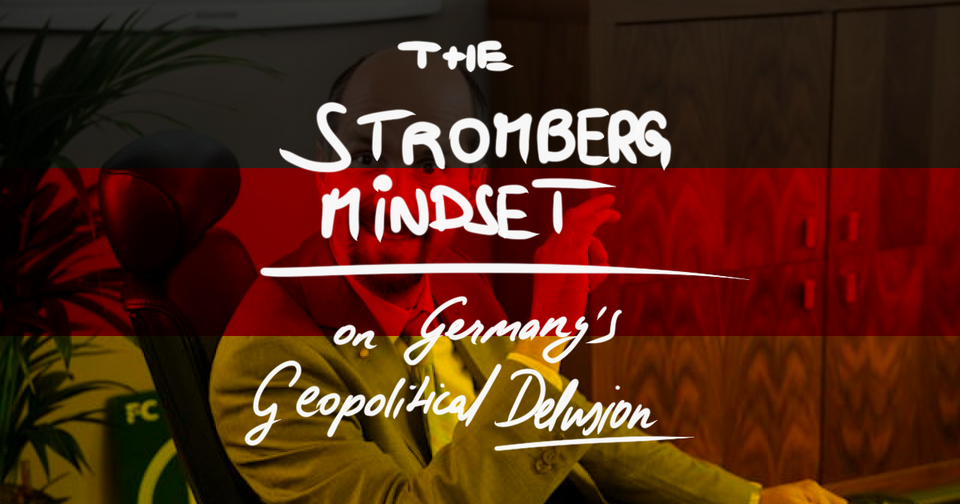
Europe is at war and Germany is doing nothing.
Why?
I have a theory and its called the Stromberg Mindset:
The Stromberg Mindset describes the state when someone is rendered useless by their own narrative.
To understand the Stromberg Mindset I'll take you on a metaphorical journey through three versions of the TV show The Office.


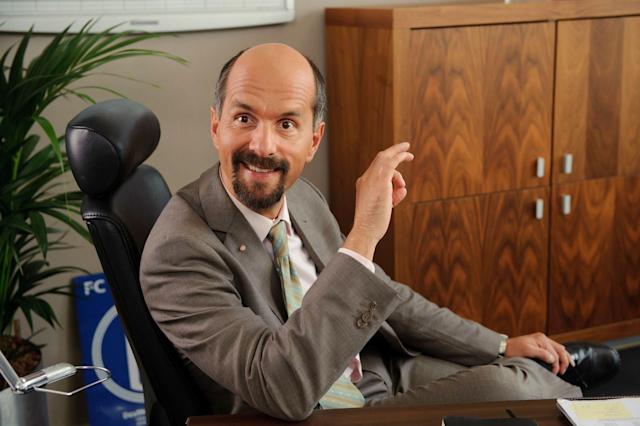
- The British version reveals three distinct groups in every organization
- The US version shows how delusional narratives are formed and reinforced
- The German version illustrates how narrative loops can be broken
I will unpack Germany's inaction on economic sanctions against Russia, namely the much-discussed embargo on Russian gas.
By the end of this article, you will understand why Germany's current government looks like a deer in the headlights and what might come next🦌 👀 🚗
The Gervais Principle: Losers, Sociopaths, and Clueless
Venkatesh Rao wrote a fantastic series called “The Gervais Principle” — named after the actor Ricky Gervais, who plays the boss in the UK show The Office 🇬🇧
The Three Groups and Their Relationship to Reality
The foundation of this piece is that eventually, all organizations start to “self-stratify into three predictable layers”:
- The Losers: People lacking economic leverage. Deeply in touch with reality since they are executing orders and are generally the first to suffer any consequences.
- The Sociopaths: People lacking compassion and hence able to exert their power to the advantage of an organization. They manipulate reality — literally and figuratively.
- The Clueless: People intermediating between Losers and Sociopaths — also known as “Middle Management”. Out of touch with reality, hence they need to come up with a story to make sense of why they are doing what they are doing.
Losers and Sociopaths are entrenched in reality, day-in-day-out.
The Clueless only relay information between the two other groups and don't get in touch with reality at all.
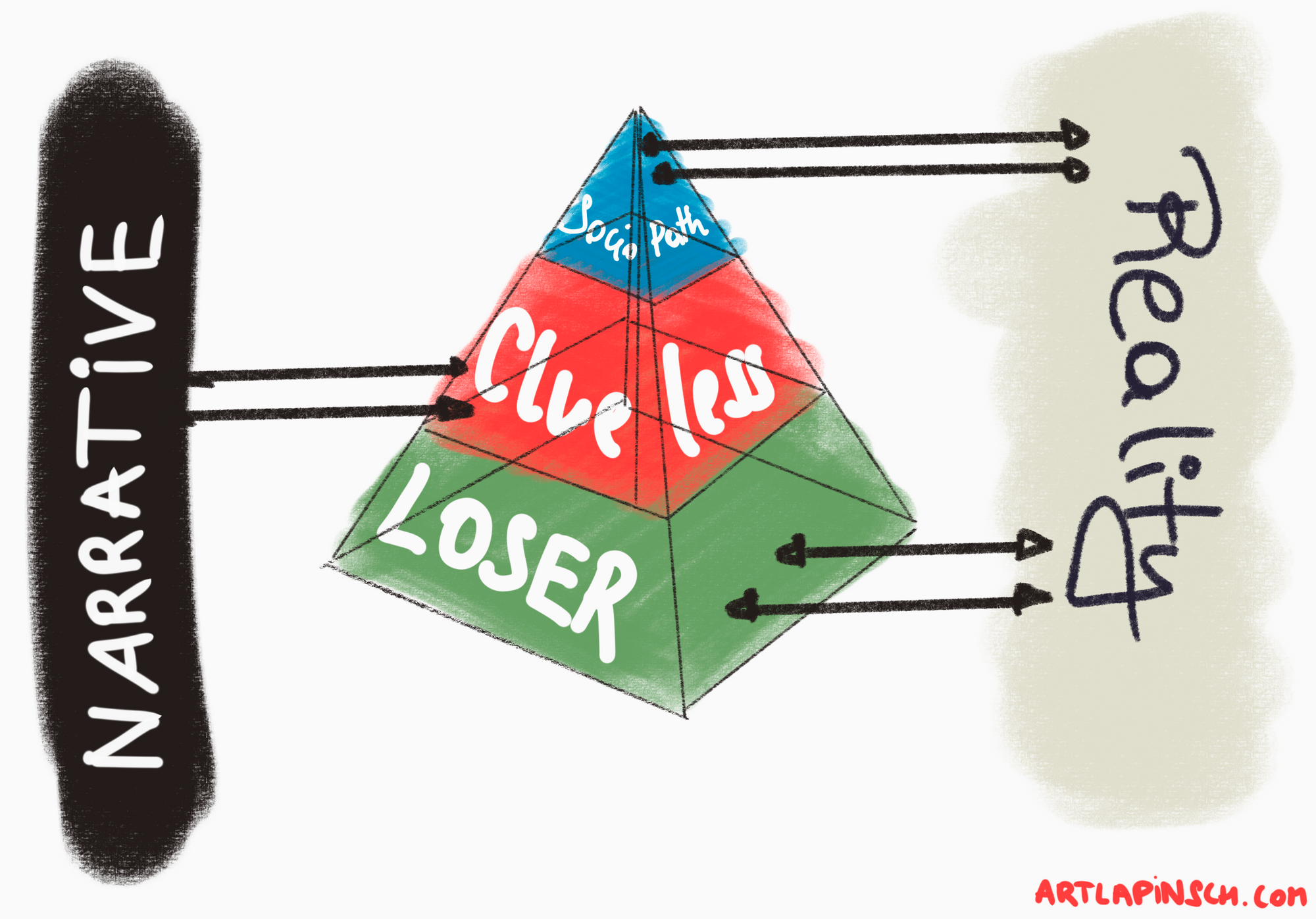
Communication Patterns of the Social Hierarchy
Another insight of Rao's piece was that there are different modes of communication in such a social structure.
For our analysis, I want to highlight the three most important ones:
- Posture Talk: Clueless signaling their narrative to each other (internally) and to the other groups (externally).
- Baby Talk: Sociopaths and Losers responding to Posture Talk by not taking it seriously. Clueless perceive this as encouragement.
- Straight Talk: Rare cases where someone "tells it as it is". Mainly when Sociopaths talk to Losers.
Here are two examples of Germany's Posture Talk in relation to energy imports from Russia:
- 🇷🇺 Russia: "Wandel durch Handel" → A geopolitical strategy with the goal to change adversarial political stances through trade. Germany has applied this logic to the Soviet Union and Russian Federation since Willy Brand's Ostpolitik of the 1970s.
- ⛽️ Energy: “Nord Stream 2 pipeline to bring Russian gas to Germany should not be mixed up with political and human rights disputes with Moscow.”
Takeaway: Proactive, Reactive, and Inactive Mindsets
My personal takeaway from the Gervais Principle is that Losers, Clueless, and Sociopaths are not only static groups but mindsets that can be changed dynamically.
An individual can progress up and down this social ladder and as a result will change their relationship to reality.
For the sake of geopolitical analysis I will rename these groups based on their interaction with reality:
- Losers → Reactive
- Sociopaths → Proactive
- Clueless → Inactive
The Proactive group is shaping reality, the Reactive group responds to it, and the Inactive group is concerned with their own narratives.
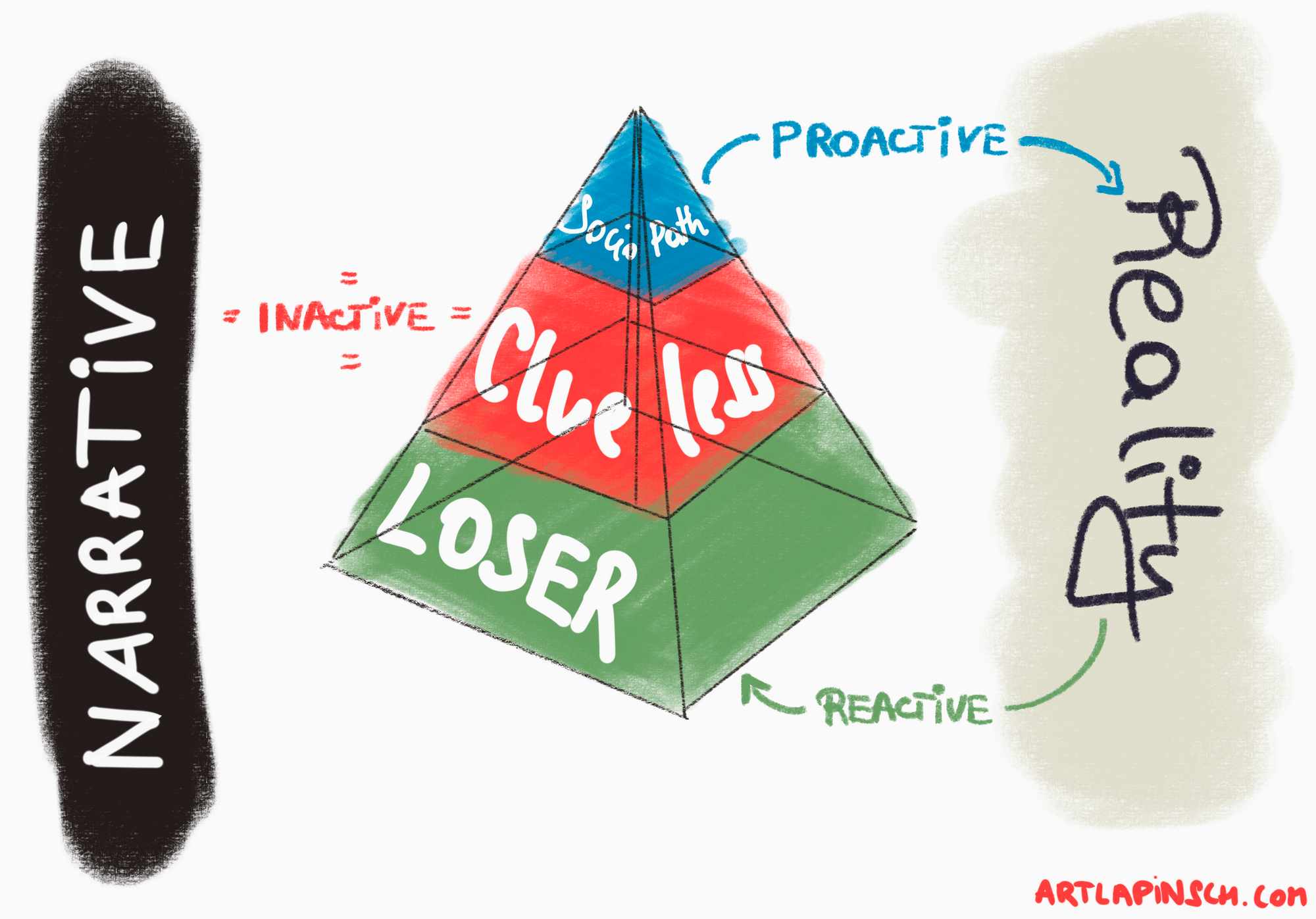
I'll explain in the next section 👇
The Michael Scott Theory of Social Class
Alex Danco followed up with “The Michael Scott Theory of Social Class” — named after Michael Scott, the boss in the US show The Office 🇺🇸
Danco took the Gervais Principle and re-applied it to the context of social mobility in the US where there are three groups of people.
- Labour = Losers = Reactive
- Educated Gentry = Clueless = Inactive
- Elites = Sociopaths = Proactive
In my opinion, the key paragraph is the following one:
What’s interesting here isn’t the language of [Reactive] or of the [Proactive] – both of these groups see the world more or less as it is. It’s the language spoken by and to the [Inactive]. Both reveal the extent to which this group has become detached from normal reality, and also the care taken by others (mostly [Reactive]) to manage this detachment carefully.
This statement reinforces that the Inactive group are spoken to in Baby Talk, which reinforces their own narrative.
As more of the language surrounding you becomes Posturetalk and Babytalk, the more conclusively you will double down on being “serious” about whatever you’re pursuing, as both a defense mechanism and in pursuit of real praise. This drives the cycle forward again, as your values and environment become increasingly defined by doing [X].
In the context of Germany's stance on Russian gas imports I can see the following causal flow loop happening:
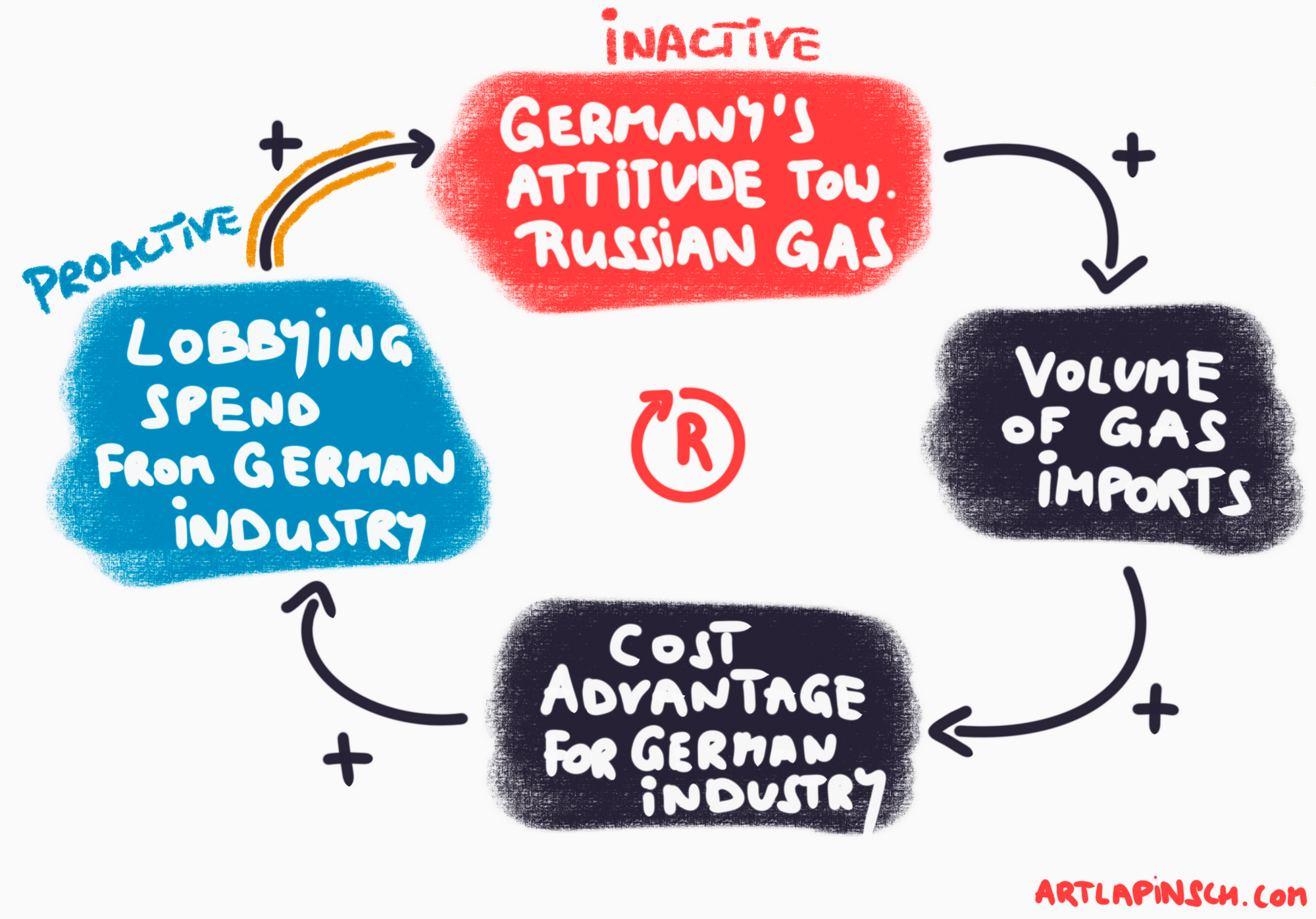
Two factors contributed to Germany's narrative of a successful Ostpolitik:
- Strong Domestic Industry: Companies like BASF are world market leaders because of their production cost advantages.
- No Consequences: Up until February 24th all warnings from the US and CEE countries was brushed away as "unjustified hysteria" since Russia was behaving just fine.
Well... it was fine until it wasn't.
The Stromberg Mindset
Bernd Stromberg - the boss character of the German Office show - reminds me of Germany because he's completely detached from reality. He's a middle manager and fits our framework perfectly.
- Gervais Principle: There are three groups of people and the Clueless/Inactive are detached from reality and exist in their own narrative
- Michael Scott Theory: As a result of their environment, the Clueless/Inactive group detaches further from reality as time goes on
With the Stromberg Mindset I try to extend Rao's and Danco's ideas:
The Stromberg Mindset describes the state when someone is rendered useless by their own narrative.
Identifying the Stromberg Mindset
On the day when Russia invaded Ukraine, the geopolitical players could be grouped as such:
- Russia was proactive 🇷🇺
- Ukraine was reactive 🇺🇦
- Germany was inactive 🇩🇪
Two months later and Ukraine has adapted quickly and has taken control of their own situation as much as possible. They have changed their mindset almost immediately.
Yet Germany's inaction remains.
The Russian Gas Dilemma and Similarities to Greece's Debt Crisis
This is what Germany’s energy mix (check out the gas chart) looks like today 👇
- Germany bet on a future where Russia would stay a political and economical ally.
- Germany bet on a future where they could benefit from cheap prices on Russian gas.
- Germany’s bet did not price the geopolitical risk.
This sounds familiar 🤔 🇬🇷
Germany’s Greek crisis.
— Thomas PHILIPPON (@ThomasPHI2) April 3, 2022
11 years ago Greece faced a sovereign debt crisis because of:
- irresponsible fiscal policy
- bad luck
Today Germany faces a geopolitical crisis because of:
- irresponsible energy policy
- bad luck
A combination of poor policy making and bad luck is no excuse.
In Poker you would evaluate the Quality of your Decision rather than the Quality of your Outcome and conclude that it was poor skill paired with bad luck.
Germany gambled and Europe lost.
Still, Germany does not want to take responsibility and is blocking EU's attempt for an embargo on Russian gas.
There are two examples of Germany's narrative that I want to highlight:
- "Small Impact on Russia": Germany claims that an embargo would not inflict enough damage on Russia while Putin's former aide says that a "full embargo on oil and gas could stop the war".
- "Large Impact on Germany": Germany claims that an embargo on Russian gas would have catastrophic consequences for its economy, yet independent economists as well as economists from the German Central Bank have calculated that an embargo would result in a minor recession of 3-5%.
The fact that Germany doesn't want to budge on their "no embargo stance" seems delusional to me.
As per Oxford Languages, a delusion is “an idiosyncratic belief or impression maintained despite being contradicted by reality or rational argument, typically as a symptom of mental disorder.”
Back to Reality: Breaking Points of Reinforcing Narrative Loops
When we talk about systems we have to think about stocks and flows.
- Germany's attitude towards Russian Gas is a stock (a measureable quantity).
- Information influencing Germany's attitude is a flow (a quantity over time).
In the past Germany had a lot of reinforcing information flowing into its attitude (Lobbying interest, historically Russian-friendly policies ["Ostpolitik"; "Wandel durch Handel"], and a lack of consequences).
Yet I believe that a similar loop as the one below will significantly impact Germany's decision making in the coming weeks👇
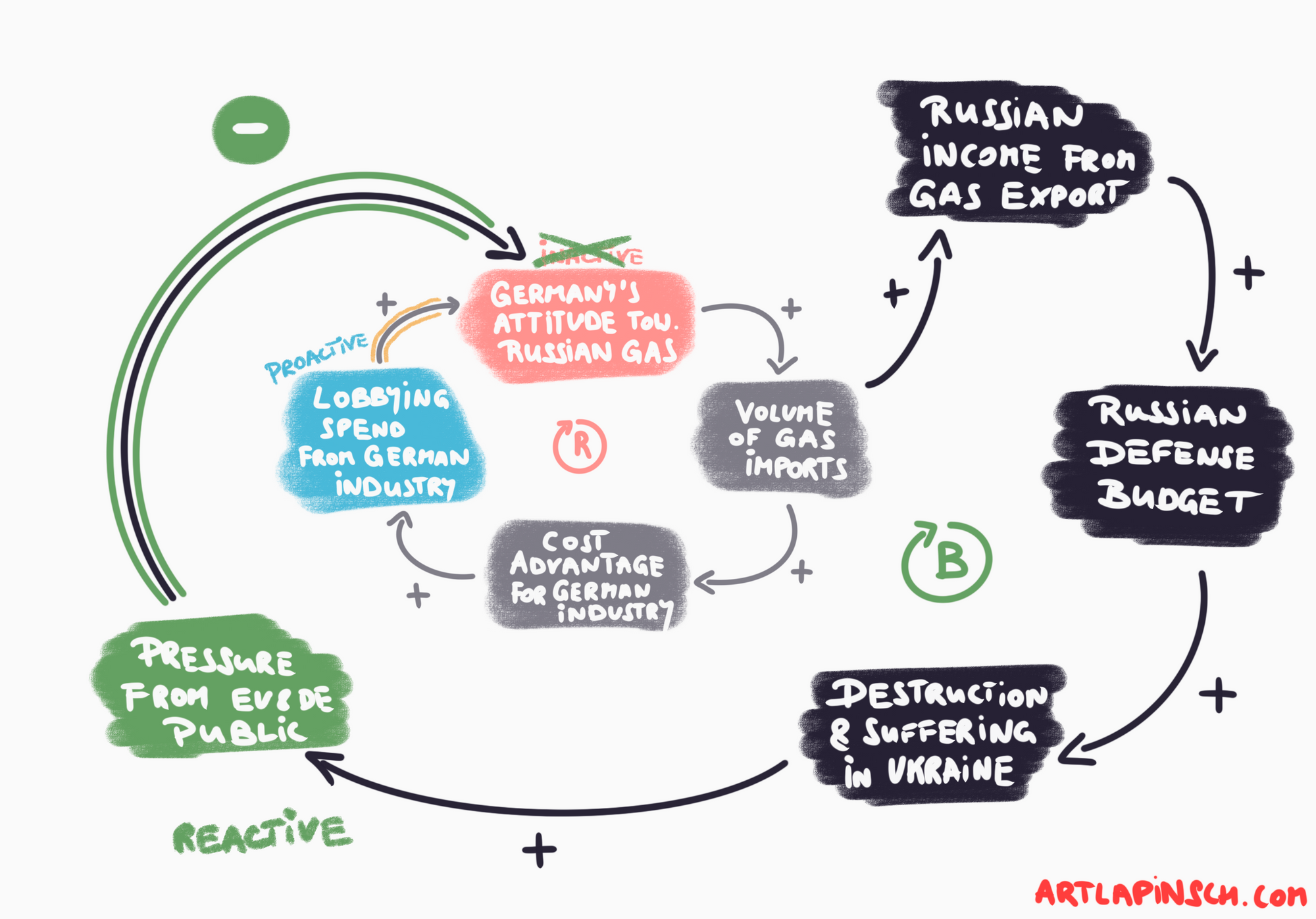
The figure describes the following:
- German spending on Russian oil & gas increases Russian income from exports
- Russian income can and will be used to finance the War in Ukraine
- More budget means more troops and equipment to inflict damage to Ukraine
- The voting public in Germany and the EU increases pressure on the German government, since they side with Ukraine
The important aspect in this illustration is that "Pressure from Public" has a negative impact on Germany's attitude towards Russian gas. Once this happens, all the (+) signs in the flow are changed into (-) signs.
- Pressure from the public leads to a reduction in Germany's (positive) attitude towards Russian gas
- If Germany's (positive) attitude decreases so will the volume of gas imports
- Less gas imports means less export income for Russia
- And so on and so on...
Information: The Ultimate Leverage Point
To quote Donella Meadows - the godmother of Systems Thinking Theory - when she was talking about information as a leverage point:
You can often massively change the behavior of a system by changing how the information flows through it and who has access to it.
Now, Germany is flooded by information from a lot of angry people. Rightfully so.
It's not only the general public but also the academic community, think tanks, and all other EU countries.
50 Members of the European Parliament addressed Chancellor Scholz with a call to support immediate Russian energy embargo. Germany has a responsibility to lead European democratic community in the face of authoritarian aggressor. EU cannot finance this war! pic.twitter.com/orJlCsHLO3
— Andrius Kubilius (@KubiliusA) April 25, 2022
At some point this pressure will be so large that Germany's current stance will be politically untenable and Germany will be snapped out of its Stromberg Mindset.
Bottomline: Stop Baby Talk. Start Straight Talk.
Let's bring it back full circle.
IF information is a powerful leverage point and IF our goal is to break a reinforcing narrative THEN we have to change the mode of communication.
We discussed that there are two main reasons for the Stromberg Mindset:
- Posture Talk: Internal reinforcement.
- Baby Talk: External reinforcement.
Since we can only control #2 we have to change it to Straight Talk.
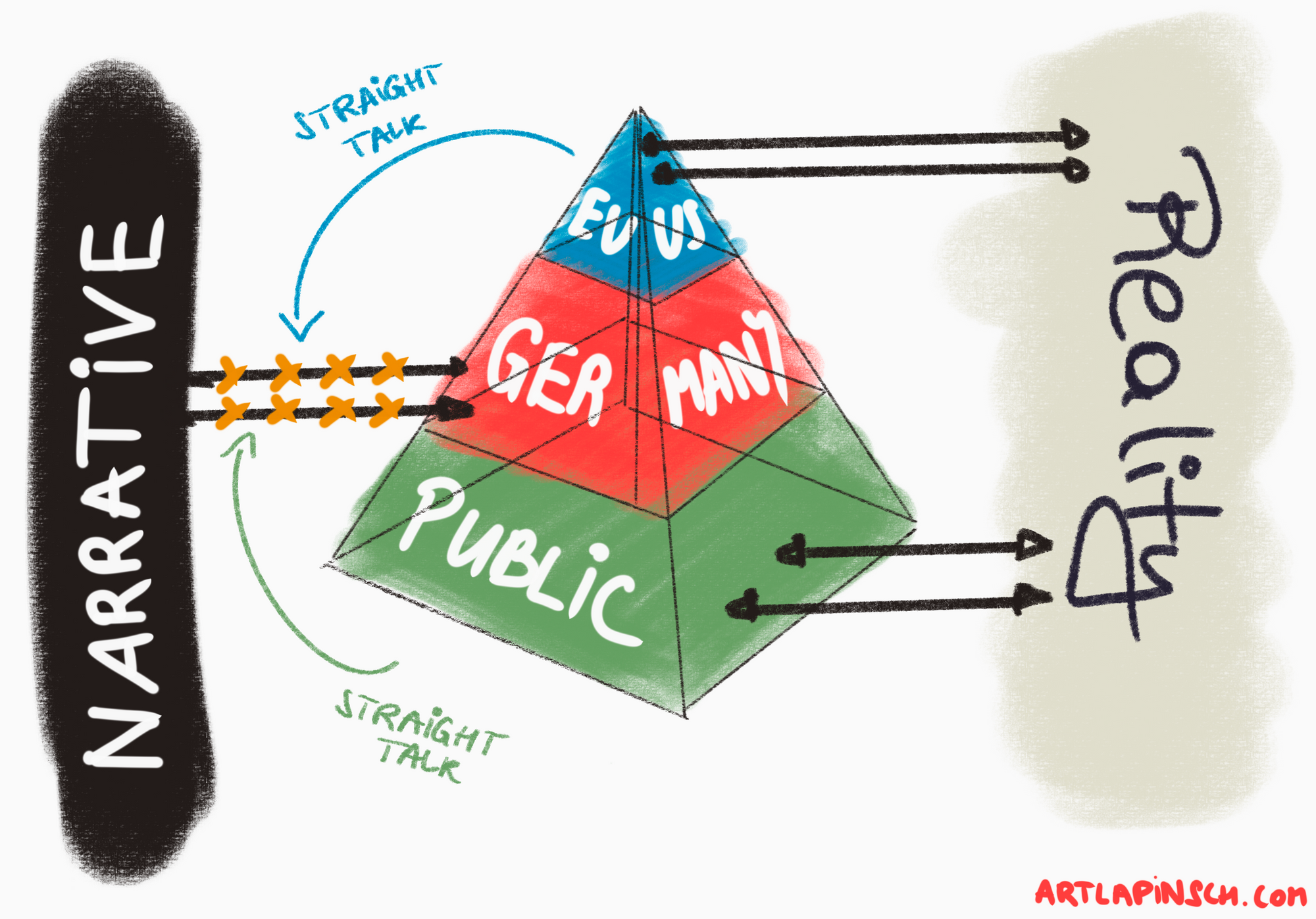
More inaction means more suffering for the Ukrainian population. The only question is how quickly Germany will wake from its delusional slumber.
The longer Germany waits, the more similar it will become to Bernd Stromberg:
- No credibility
- No leverage
- No friends
Germany, it’s time to wake up ⏰
Further Reading
- Interview: Ramez Naam, futurist, author, and investor (Noahpinion) → Comment Art: read this to understand possible policy responses for an embargo from Russian energy + second-order effects. It's a generally uplifting read 👌
- What if Germany is cut off from Russian oil and gas? (LSE)
- Preparing for the first winter without Russian gas (Bruegel)
- Was waere wenn...? (Leading Econ Paper on impact of Gas embargo)
- The Former Chancellor Who Became Putin’s Man in Germany (NYT)
- Putin's Useful German Idiots (Politico)
- Wladimir Putin speech at German Bundestag (YouTube)
- Ostpolitik (Wiki)
- "Don't blame others for your problems" (Twitter)
- Emanuel Macron as Michael Scott (David Mosquera)





